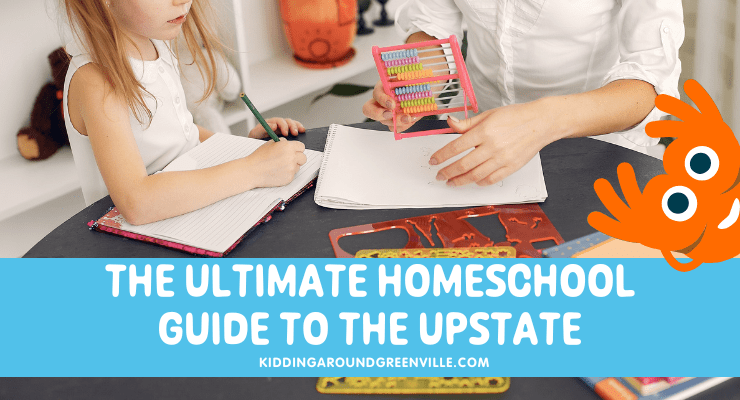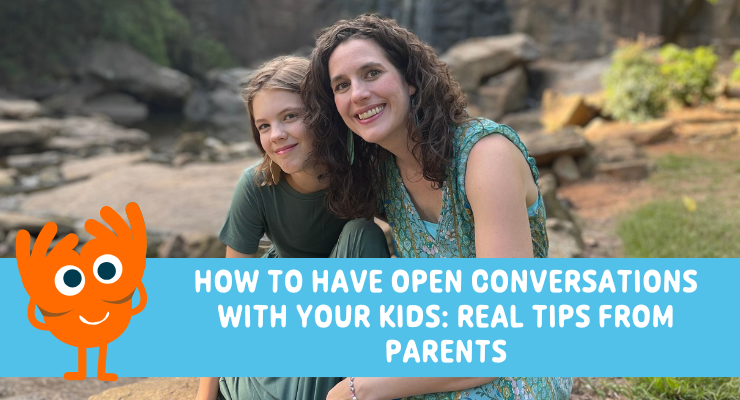Inside: Real-world advice from parents in our community on how to keep communication open with teens and talk about sensitive topics like drugs and alcohol.
Talking to your kids as they grow older can feel like navigating a maze—especially when it comes to tough topics like drugs, alcohol, and independence. But open, honest communication is possible—and essential. We asked our Kidding Around community for their best tips. Here’s what they shared.
This article is written as part of the Open Conversation Initiative with South Carolina DAODAS.
1. Work on Real Connection Beyond Serious Conversations
Your teen may act like they don’t need you, but don’t let that fool you—they crave your attention and presence more than they’ll admit.
- Be curious, not critical. Learn what excites them. Show interest in their favorite games, music, or trends—and listen without judgment.
- Do fun things with them. Coffee runs, thrift shopping, or even watching TV or playing a video game together can build trust.
- Make your home their comfort zone. Invite their friends over. Offer snacks. Keep things low-pressure.
- Balance the serious and the silly. You will never get to the conversation about mental health and drug dangers if you aren’t already talking about less serious topics.
- Have conversations not interrogations. The question, “How was school today?” might be a big question to answer. Give space for your kids to share on their terms when it’s not safety related information.
💬 “I’ve been very transparent and talk openly with my kids about addiction issues in our family. And then, we just talk—about anything and everything. We ask clarifying questions, admit when we don’t know, find out answers together, etc. I’ve never parented before and we’re learning together. So, long story short, building a foundation of trust on the front end makes some of these conversations easier later on.”
2. Don’t Overreact When They Share
When your teen opens up, how you respond can determine whether they ever do it again.
- Pause before reacting. If they mention something shocking, stay calm. It’s okay to say, “That’s serious. Let me think a moment and let’s talk more in a bit.”
- Ask non-threatening questions. Use “What happened?” or “How did you feel?” instead of questions that shut down the conversation.
- Communicate in ways that feel safe to them. Not every conversation has to be face-to-face. Some of the deepest ones might come through a text. That’s okay. Go where your kid feels safe.
💬 “It is important to let them know that although you may not always agree with their behavior or decisions, you are always there and love them unconditionally. Reach out and ask how they are doing? Let them know they can come to you. Be honest about mental health issues in our society including stress anxiety and depression. Tell them about the heightened dangers of drugs today and how drugs are laced with fentanyl. One pill can kill etc. Also, incorporate fun times together where heavy topics are not discussed . Balance it.”
3. Create Space for Disagreement
Independence and differing opinions are part of your teen’s growth. Don’t overreact when they disagree with you.
- Practice active listening. You don’t need to correct every statement. Let them talk and feel heard.
- Don’t take it personally. Disagreement doesn’t mean rejection—it means they’re exploring who they are. They are still growing and their opinions are still changing.
- Be open to negotiation. Let them share their reasoning. You might even reconsider a rule based on a solid argument.
4. Be Clear With Expectations and Safety Nets
Teens need clarity around boundaries—and they need to know you’ve got their back if things go wrong.
- State your rules explicitly. “You’re not allowed to vape or drink” is better than assuming they know.
- Explain the risks. Talk honestly about consequences, especially dangers like fentanyl exposure.
- Use a safe word system. Create a code they can text if they need a non-judgmental exit from a party.
- Be consistent with consequences. Follow through if trust is broken, but work together to rebuild it.
💬 “If you or a friend drinks or uses drugs, call me. I will come get you. No punishment. No lecture. Just safety. We’ll talk when you’re ready and safe.”
5. Know Your Limits and Surround Your Kid with Safe Adults
You don’t have to do this alone—and your teen shouldn’t have to either.
- Watch for mental health struggles. Anxiety and depression often show up as withdrawal or risky behavior. Talk to your doctor if you see concerning behavior. They often can point you to additional resources from great therapists to support groups.
- Connect them with other adults. Be sure your kids know who the trusted adults are in your life that you trust to help them whether it’s an aunt, grandparent, or friend. Remember that it’s better for them to share with someone safe rather than no one if they don’t talk to you.
- Focus on what you can control. You can’t prevent every mistake your kid might make, but you can provide tools and guidance.
Final Word: Keep the Door Open
Your teen needs to know one thing above all: you’re there for them. Always.
Even when they disagree with you. Even when they mess up. Keep checking in. Keep creating safe space for honesty. And keep choosing connection, again and again.







































